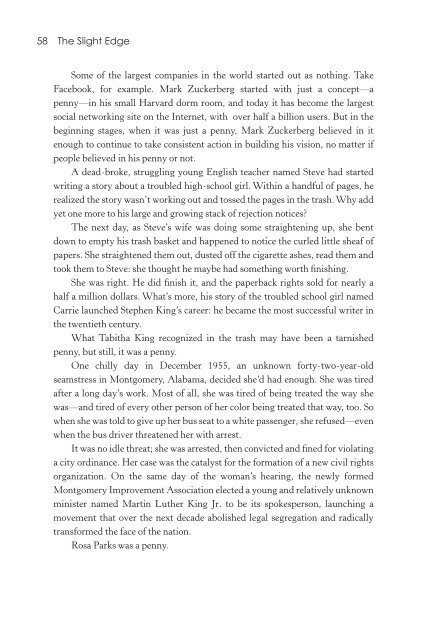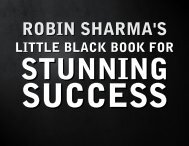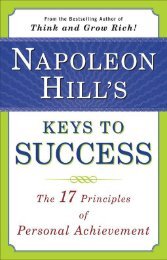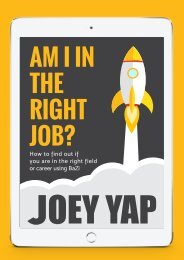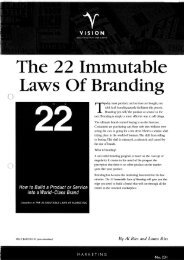The-Slight-Edge
Create successful ePaper yourself
Turn your PDF publications into a flip-book with our unique Google optimized e-Paper software.
58 <strong>The</strong> <strong>Slight</strong> <strong>Edge</strong><br />
Some of the largest companies in the world started out as nothing. Take<br />
Facebook, for example. Mark Zuckerberg started with just a concept—a<br />
penny—in his small Harvard dorm room, and today it has become the largest<br />
social networking site on the Internet, with over half a billion users. But in the<br />
beginning stages, when it was just a penny, Mark Zuckerberg believed in it<br />
enough to continue to take consistent action in building his vision, no matter if<br />
people believed in his penny or not.<br />
A dead-broke, struggling young English teacher named Steve had started<br />
writing a story about a troubled high-school girl. Within a handful of pages, he<br />
realized the story wasn’t working out and tossed the pages in the trash. Why add<br />
yet one more to his large and growing stack of rejection notices?<br />
<strong>The</strong> next day, as Steve’s wife was doing some straightening up, she bent<br />
down to empty his trash basket and happened to notice the curled little sheaf of<br />
papers. She straightened them out, dusted off the cigarette ashes, read them and<br />
took them to Steve: she thought he maybe had something worth finishing.<br />
She was right. He did finish it, and the paperback rights sold for nearly a<br />
half a million dollars. What’s more, his story of the troubled school girl named<br />
Carrie launched Stephen King’s career: he became the most successful writer in<br />
the twentieth century.<br />
What Tabitha King recognized in the trash may have been a tarnished<br />
penny, but still, it was a penny.<br />
One chilly day in December 1955, an unknown forty-two-year-old<br />
seamstress in Montgomery, Alabama, decided she’d had enough. She was tired<br />
after a long day’s work. Most of all, she was tired of being treated the way she<br />
was—and tired of every other person of her color being treated that way, too. So<br />
when she was told to give up her bus seat to a white passenger, she refused—even<br />
when the bus driver threatened her with arrest.<br />
It was no idle threat; she was arrested, then convicted and fined for violating<br />
a city ordinance. Her case was the catalyst for the formation of a new civil rights<br />
organization. On the same day of the woman’s hearing, the newly formed<br />
Montgomery Improvement Association elected a young and relatively unknown<br />
minister named Martin Luther King Jr. to be its spokesperson, launching a<br />
movement that over the next decade abolished legal segregation and radically<br />
transformed the face of the nation.<br />
Rosa Parks was a penny.


